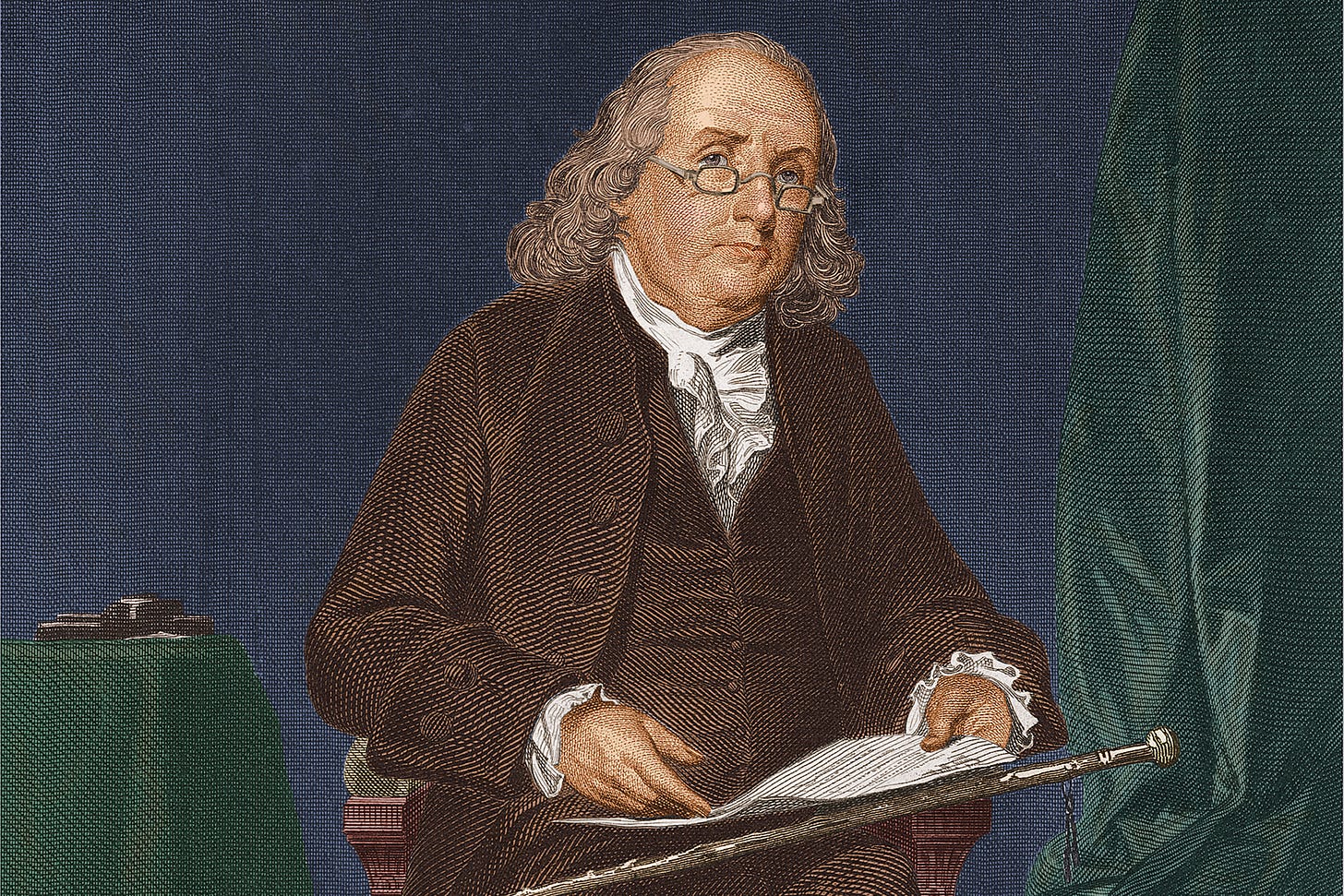Ben Franklin's Presbyterianism
I mentioned the other day that “Presbyterian” is a somewhat ambiguous, polemical term in late eighteenth century America. Presbyterians were whigs, republicans, insurrectionists, etc., or at least these combinations appear frequently as if one sentiment necessarily disposed one to the others.
There’s a good article at Log Press that mentions Ben Franklin’s own equivocation between Congregationalism and Presbyterianism. He claimed to have been raised Presbyterian, but his baptism and membership belonged to a Congregationalist church (Old South).
Point being, ecclesiastical precision was not reflected in polemics. Presbyterianism, for Franklin, seems to have referred more to religious zeal than Calvinist dogma, though the two were related and he was evidently annoyed by the dogmatism of actual Presbyterians, though he printed many Presbyterian sermons and an edition of the Westminster Standards. Not too much should be taken from this latter fact, however. Franklin was a successful printer because he was an opportunist and had his finger on the pulse of popular appetites. All his print record signals is that Americans were reading sermons, wanted copies of the Standards, and that short books were cheaper to publish than long ones, the latter more cheaply imported from London.
This write up from the Smithsonian on Franklin’s printing and editing career is worth your time. Note especially the eclecticism of the Gazette. Someone should try to revive this style. It might appeal especially the schizo zoomers and would otherwise be entertaining: literal fake news, tabloids, snippets of Xenophon, a sermon on justification, interviews with congressmen, advertisements, and basically tweets all in one issue! I also very much like his Apology for Printers: “if all Printers were determin’d not to print any thing till they were sure it would offend no body, there would be very little printed.” He notes that those of us who deal in the business of opinions necessarily develop a certain detachment, “calmness and indifference” to things published.
Back to Presbyterianism. Franklin clearly understood ecclesial differences. He published many reports on synodical goings. But equivocations remain and descriptions are sometimes opaque. Why, for instance, does Franklin say in 1755 that “our Frontier Inhabitants” are “chiefly Presbyterians or Churchmen.” Does Presbyterian stand simply for a churchman or is it merely a species of the genus? Or, perhaps, “Churchman” means Anglican, as it seems to in another letter where he asks whether a ministerial candidate is to be a “Presbyterian or Church parson.” In this case, does “Presbyterian” merely mean non-conformist or is Franklin just referring to the two dominant options in the middle colonies? (Witherspoon, as I recently pointed out, said that New Jersey was dominated by episcopacy and presbyterianism in almost equal measure, the latter having both English and Dutch options.) Franklin doesn’t ever seem to equivocate between Presbyterians and Anglicans.
Then, at times, Presbyterianism means intolerance: “we zealous Presbyterians being too apt to think ourselves alone in the right, and that besides all the Heathens, Mahometans and Papists, whom we give to Satan in a Lump, other Sects of Christian Protestants that do not agree with us, will hardly escape Perdition.”
The French historian Jacques François Mallet du Pan reported that
“Franklin often told his disciples in Paris, that whoever would introduce the principles of primitive Christianity, into the political state, would change the whole order of society. An absolute equality of condition; a community of goods; a Republic of the poor and of brethren; associations without a Government; enthusiasm for dogmas, and submission to chiefs to be elected from their equals,—this is the state to which the Presbyterian of Philadelphia reduced the Christian Religion.”
This gives us a little more of a feel for the range of meaning in the label. But the ecclesial primitivism would more easily be associated with Congregationalists. Where the radical equality comes from, I’m not sure. Franklin lived in Congregationalist Massachusetts and could not have picked it up there. Franklin had high praise for Scottish Presbyterians, though he thought that “tender” and “noble race” had basically died out. He didn’t talk about Philadelphia Presbyterians the same way. What he is communicating, however, is a certain blurring of church and state and governance by elected church elders, or something like that. The “associations without government” might refer to the synodical preferences of Presbyterians (i.e., without governmental oversight or interference). If this was common sentiment, maybe that’s what other critics feared, yet Franklin here is not obviously critical or negative. “Presbyterian” Christianity, if fully implemented, would change the whole of society. All very curious stuff. If anyone has better insights on this particular passage, do send them my way.




